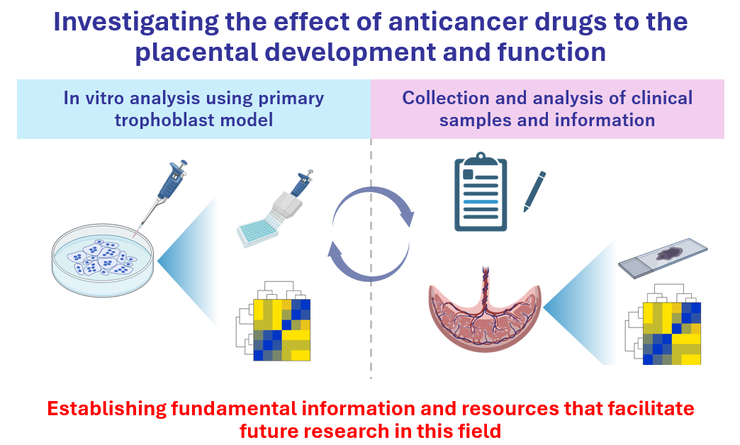Investigation of the effects of anticancer drugs on placental development and function
Abstract
Cancer treatment outcomes have been remarkably improved in recent years. Consequently, the focus has been shifted from simple survival from the cancer to discussing how to improve the quality of life for patients during and after anticancer treatment. Particularly, given that cancer patients from the adolescent and young adult (AYA) generation face various life events during and after treatment, it's important to provide tailored support for each individual.
Pregnancy/childbirth is one of the most significant life events for the AYA generation. Due to the trend of delayed marriage and increasing maternal age, the frequency of cancer being discovered during pregnancy is on the rise, which needs to be addressed.
Anticancer treatment during pregnancy follows the principle of providing the best therapy for the mother while minimizing harm to the baby. Chemotherapy plays a central role in the anticancer treatment during pregnancy. Depending on the type of anticancer drugs, they can be used after the organogenesis period, and the reported benefits of them far outweigh the risks.
The placenta is the most crucial organ for growing the fetus and maintaining pregnancy. Besides the gas exchange and nutrition supply to the fetus, it also acts as a barrier to block drugs administered to the mother. In the past, the impacts of chemotherapy during pregnancy has often been assessed based on its direct effects on the fetus. However, the effects of anticancer drugs to the placenta is poorly understood.
This study herein aims to establish fundamental information and resources for future research by investigating how chemotherapy affects the placenta using a model of primary placental cells (trophoblast cells), and by collecting patient information and placental samples from pregnant women who underwent anticancer treatment during pregnancy.
Perspectives
This study will reveal the effects of anticancer drugs on placenta and its mechanisms, which allow us to investigate new strategies to combat the cancer without potentially harmful effects during pregnancy.
This study will help the understanding of the benefits and risks of anticancer treatment during pregnancy, supporting better informed consent to the patients that may relief their anxiety to the treatment.
Comments from principal researcher
Kenichiro Motomura, Researcher, Department of Allergy and Clinical Immunology, National Research Institute for Child Health and Development
In this study, we investigate the effects of anticancer drugs on placental development and function from the viewpoint of both clinical and basic research. Pregnant women who undergo anticancer treatment often suffer from not only their disease condition but also their babies' health. We hope that our study can improve our understanding of safety and risks of anticancer drugs to the placenta, and provide useful information and potential preventing strategies to avoid the harmful effect.
Shared Researchers
Ayumi Saito, Department of Medical Oncology, National Cancer Center Hospital
Research collaborator
Atsuko Kitano, Department of Medical Oncology, St. Luke's International Hospital
Tatsunori Shimoi, Department of Medical Oncology, National Cancer Center Hospital


